We are at the foot of the Auvergne Volcano National Park. The Mirabel stream, which runs alongside the factory and gave it its name, has its source up there. "A real gem in the middle of green nature," is how Julien Brionnet, Technical Director of Bell France, describes the Saloir de Mirabel ham drying plant, which is like a second home to him.
He started there in 2000 as an employee in dried sausage production. The factory, located in the municipality of Riom, belonged to Salaison Polette from 1974, before the Bell Food Group took over the company in 2008: "It is therefore the historic production site and thus the DNA of the Bell Food Group in France. This is where it all began. This is where we acquired all our experience and know-how, first in the field of dry sausage and then in the field of Auvergne cured ham. In the beginning, the sausages were dried on wooden sticks, the air flow control was not as modern as it is today and there was a lot of manual work. Of course, there were mistakes and problems that had to be fixed, but this allowed us to constantly improve."In 2003, a new factory was built in Teilhède, about ten kilometers away. And Julien Brionnet was given responsibility for setting up the production of Auvergne cured ham. "We didn't know how to do it at first. But we were trusted and given a completely free hand." Then Rodolphe Zou, 22 years old at the time, was hired. He remembers: "The five drying rooms were empty and there were three of us. We gradually built up the production lines, adapting them as required and adding machines when necessary. That's how the company developed step by step."A gem in the Auvergne

On the way to top quality
In the beginning, Mirabel only produced cured ham without appellation. Today, only Auvergne raw ham with PGI certification is produced here, which meets the strictest specifications. "We work day and night," comments Julien Brionnet. "We are developing a local, French product that is marketed in Germany and even in Asia thanks to the Bell Food Group's distribution network. This is a clear sign of recognition that spurs us on to further improvements. We want to achieve top quality!"
Ten people currently work on the 3000 m2 site under the leadership of Rodolphe Zou, who has been production manager since 2015. Every week, 1600 hams arrive at the factory and remain there for at least 240 days, during which time they are salted (with the addition of dry garlic, which is what makes Auvergne raw ham PGI so special), matured, steamed, dried, cured and then finished.
Of the 450 tons of Auvergne PGI ham produced annually at Saloir de Mirabel, 95% comes from pigs from the region: "We could have sourced in Europe," explains Julien Brionnet, "but we deliberately opted for regional sourcing, even if the selection of our suppliers was not easy, taking into account the Bell Food Group's quality standards, traceability, transparency and human resources management."
The power duo has just completed the energy optimization of the production site with the installation of heat pumps and energy recovery: "We no longer consume fossil fuels and we no longer produce CO2." It is also working on the production of Auvergne raw ham PGI without any preservatives and with a longer curing time in order to achieve the quality of Parma ham and Iberian ham. "Tomorrow we will only have quality meat, salt, garlic and air. Nothing else!"
The development and quality of the products from the Saloir de Mirabel were awarded a medal at the Concours Général Agricole in Paris in 2017. The culmination of a positive development: "We see ourselves a bit as the nano-company of the Bell Food Group. The only thing that could force us to leave the Saloir de Mirabel would be if there was no longer enough space to meet customer demand."